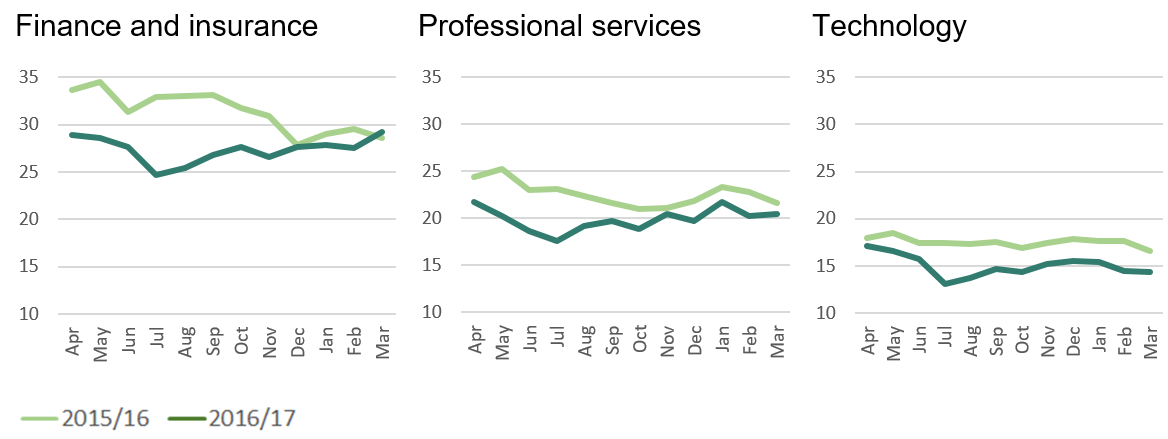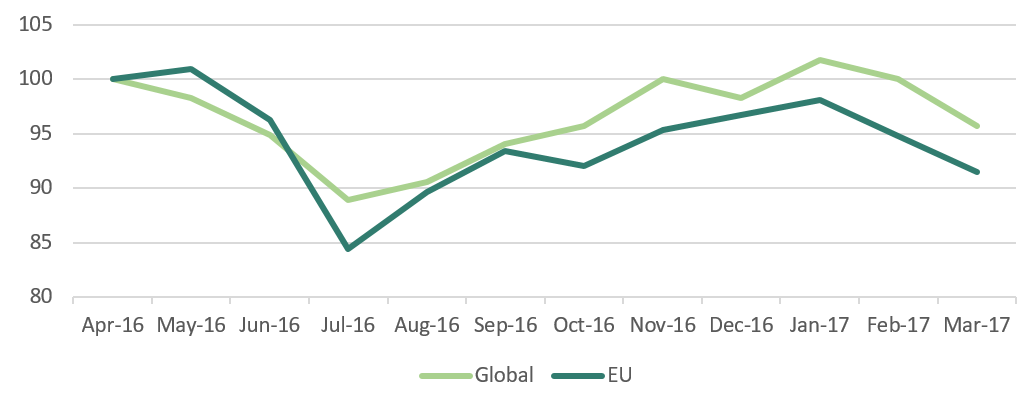
 Several UK employers and business representatives have expressed concern that Brexit could damage the country’s ability to attract skilled workers from the rest of the EU. Matthias Busse (left) and Mikkel Barslund (Centre for European Policy Studies) use LinkedIn data to examine whether these concerns are justified. They find support for the view that Brexit has reduced the attractiveness of the UK for recent high-skilled graduates from the EU, but it is far from clear whether the magnitude of this decline will have a significant lasting effect on the UK economy.
Several UK employers and business representatives have expressed concern that Brexit could damage the country’s ability to attract skilled workers from the rest of the EU. Matthias Busse (left) and Mikkel Barslund (Centre for European Policy Studies) use LinkedIn data to examine whether these concerns are justified. They find support for the view that Brexit has reduced the attractiveness of the UK for recent high-skilled graduates from the EU, but it is far from clear whether the magnitude of this decline will have a significant lasting effect on the UK economy.
Since the beginning of the year, several reports have surfaced of UK companies and employment agencies having difficulty recruiting a sufficient number of foreign (EU) workers, such as fruit-pickers and health care providers. During the referendum campaign, business representatives also stressed the importance of the EU labour pool for the UK economy and voiced concerns that Brexit could potentially stifle this inflow.
Brexiteers argued, however, that a key reason why the UK should leave the EU was precisely to allow the country to regain the ability to curtail the inflow of low-skilled people from the EU. But by no means did “taking back control” mean to restrict the influx of highly-skilled talent from Europe, as their benefit to the economy was not in dispute in the political debate.

Data from the UK National Statistics Office reveal a slight overall decline in immigration from the EU27 (EU member states excluding the UK) over the last quarters of 2016 and a marked rise of emigration of EU citizens from the UK. There are several reasons why EU citizens, both low- and high-skilled, might be less inclined to seek employment in the UK in the wake of Brexit:
- The feeling of no longer being welcome in the country.
- Concerns about the performance of the UK economy, e.g. relocation of business activity to the EU27.
- Losses in (home country) purchasing power of retained earnings due to unfavourable exchange rate movements.
- Potentially restricted access to social rights in future, including, among other things, the right to long-term residency, access to social benefits, family reunification rights and the exportability of pensions claims.
The above-mentioned stories of labour shortages are concentrated in low- and medium-skill professions. Granted, some high-skilled sectors had also experienced shortages prior to the referendum and competition to recruit international talent was intense. But the question arises to what extent have high-skilled workers changed their attitude towards the UK as an attractive destination for work?
Data from the business-networking website LinkedIn may provide some answers to migration questions, just as it has done in the past (see our previous analyses here and here). LinkedIn features advertisements for job openings and it is possible to track the number of persons living in the EU, for example, who have browsed through UK vacancies on its website. Figure 1 shows the share of those adverts that EU27 citizens clicked on which were from the UK, as a share of all clicked on ads (domestic job listings are excluded from this calculation). We only looked at the behaviour of recent graduates – that is, individuals who had graduated within the previous year – from the EU27 since they are more likely to be willing to move across borders to find a job, and because they are likely to be on LinkedIn.
Figure 1: Clicked UK vacancy ads on LinkedIn as a share of all ads clicked on by recent EU graduates, 2015-16 vs 2016-17 (%)
Source: Authors’ own calculations based on LinkedIn data
For example, in April 2015 (light green line), 23% of the job ads which recent EU graduates clicked on were from listings from the UK. To avoid seasonal effects, we compare months of 2016-17 with 2015-16 (April to March). One can see that all points in 2017 are below the previous year. In other words, there is a general decline in the UK’s share which started even before the Brexit shock hit.
What is striking is the stark dip in searches just around the referendum on 23 June 2016. Between May and July, the share of UK clicks in all clicked ads dropped by 16%. However, the subsequent recovery suggests that this was largely a temporary effect, likely due to the high uncertainty of what Brexit means for EU nationals in the UK, for EU newcomers and for the economy as a whole. After the Brexit shock had been digested, the share of UK job ads rose back to the grey dashed line which signifies the level that one would obtain if the growth rates of the previous year are applied. Thus by spring 2017, the share is back on trend and there is little evidence that recent graduates have been permanently put-off by the prospect of the UK leaving the EU.
Moreover, looking into specific sectors where the competitiveness of the UK post-Brexit had been of particular concern, interest in UK job ads also bounced back. For the financial and insurance sectors, in particular, a higher share of searches was recorded in the spring of 2017 than in the previous year around the same time (see Figure 2).
Figure 2: Share of UK ads in all clicked ads, searches by recent EU graduates of UK ads, by sector, 2015-16 vs 2016-17
Source: Authors’ own calculations based on LinkedIn data
Of course, not all of these movements are necessarily driven by the behaviour of job-seekers since they can also reflect a demand-side effect. Businesses in the UK might have been concerned about the rising administrative burden associated with foreign hires, the general uncertainty of what Brexit will mean for them, exchange rate volatility for exporting firms or even fear of an impending recession. These prospects may have brought recruitment to a temporary halt, thereby causing the share of UK adverts listed among global listings to decline. In LinkedIn data, this could show up as a relative decline in UK ad clicks, simply because there are fewer UK ads posted online. Aside from this demand-side effect, the counterfactual development in clicks on UK ads may have evolved differently than the trend in the past, due to other factors.
One way to address these issues is to compare the development in job-seeking behaviour of EU and non-EU graduates. The recovery in job interest since the referendum has been more pronounced for non-EU than EU jobseekers (Figure 3). This points to a small permanent impact on high-skilled EU citizens’ interest in UK-based jobs following the Brexit vote. While this comparison is not perfect, since non-EU citizens’ rights are affected by Brexit too – not least the possibility of moving to the continent at a later stage – it does provide some indication of the decline in attractiveness of the UK.
Figure 3: Trends in the share of UK job ads clicked on by recent graduates (EU and global), April 2016-May 2017
Source: Authors’ own calculations based on LinkedIn data
Our interpretation of LinkedIn data supports the view that Brexit has reduced the attractiveness of the UK for recent high-skilled graduates from the EU. It is far from clear, however, that the magnitude of this decline is sufficiently great to significantly affect the UK’s ability to recruit high-skilled individuals or to have a large impact on the aggregate real economy. Of course, this does not change the fact that for individuals directly affected by the Brexit negotiations – whether UK or non-UK citizens – a swift agreement on the future arrangement of mutual rights would allow for more certainty to plan their future, whether in or out of the EU.
This post represents the views of the authors and not those of the Brexit blog, nor the LSE. It first appeared at LSE EUROPP.
Matthias Busse is a Researcher in Economy and Finance at the Centre for European Policy Studies.
Mikkel Barslund is Research Fellow in Economy and Finance at the Centre for European Policy Studies.









